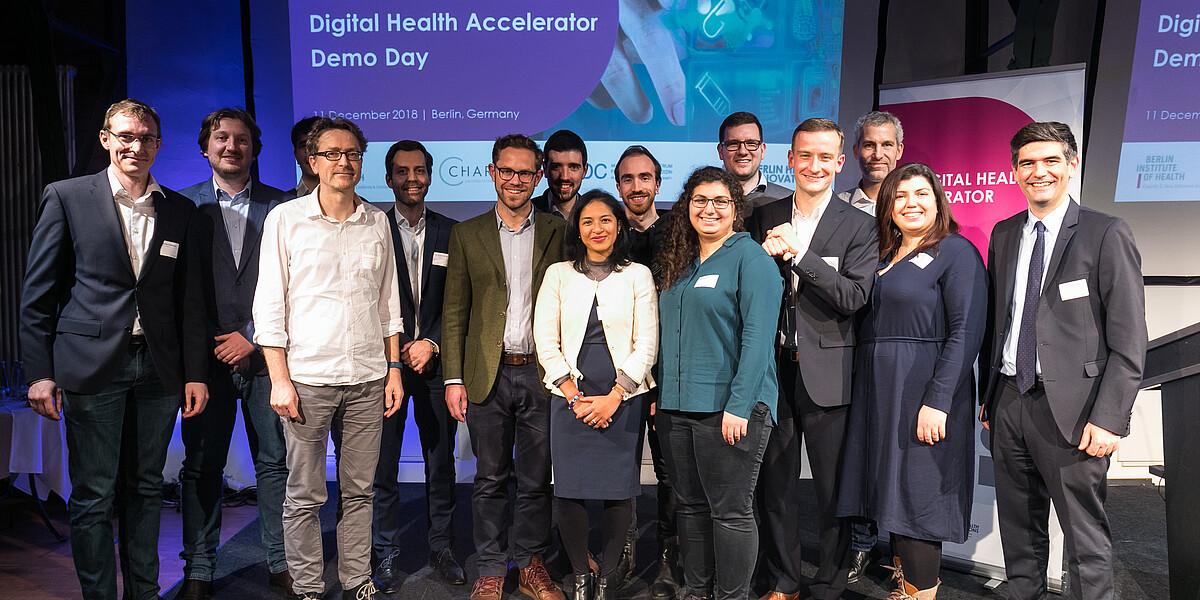It was showtime on December 11, 2018: At the second “BIH Digital Health Accelerator Demo Day”, six teams of young researchers and physicians presented their digital innovations for the future of medicine: They see a world in which cancer and cardiovascular or even dental diseases can be diagnosed with greater precision, rehabilitation after surgery can be monitored digitally, our internal clocks can determine the best time for taking medication, and developing countries can ensure better health care. The audience was made up of around 100 investors, representatives of funding organizations, politicians, and colleagues.
The teams were funded by the Digital Health Accelerator of the Berlin Institute of Health (BIH) for a full year. They had free access to coaching and mentoring, and in a co-working space they were able to translate their digital concepts into marketable products. “The Digital Health Accelerator pilot program at the BIH focuses on turning technological concepts into prototypes that provide a real benefit for patients and, at the same time, present an interesting business model. And we also maintain close contact with doctors, patients, and partners from research and industry,” says Klaus Nitschke, Head of the Digital Health Accelerator.
A project from the program’s first year proves that the concept works: An aspiring heart surgeon from the German Heart Center in Berlin, Dr. Alexander Meyer, developed an early warning system for the intensive care unit. All measured values from patient monitoring were then collected and evaluated by a software program, and an alarm is triggered if any critical threshold is exceeded. “The ‘Digital Health Accelerator’ program has helped to move the project beyond a purely scientific context towards providing concepts for practical clinical application,” Meyer reported. The system could be implemented regularly beginning in 2020. As Meyer intends to continue working as a heart surgeon instead of running a company, the team at the Digital Health Accelerator also helped him to recruit a managing director for his future start-up, Nitschke reported. “This is why we set up a network of ‘Entrepreneurs in Residence’. This group is made up of entrepreneurs who have already founded and sold their first company and who are interested in creating another start-up in the digital health sector.”
“The mission of the Berlin Institute of Health (BIH) is to transfer innovation to the patients,” says Rolf Zettl, Chief Financial Officer and Member of the Executive Board of the BIH. “Unlike in the fields of pharmaceuticals and medical technology, there are no established instruments and partner institutions in the dynamic digital health sector with which we can promote this transfer. We then launched the “Digital Health Accelerator” in 2017 as an experiment. And from our point of view, it has been very successful!”
Zettl also expressly thanked the member of the German Bundestag Swen Schulz, who showed his interest in the “experiment” from the outset and provided the initial funding support. Schulz, a member of the Budget Committee of the German Bundestag, was impressed. “The Accelerator exemplifies the enormous potential that the digitalization of healthcare has for maintaining case histories, improved and more efficient treatment as well as overall patient care. Digital health solutions such as those at the BIH offer enormous opportunities in Berlin by bringing together a vibrant start-up scene, a high-capacity healthcare industry, and outstanding research facilities.”
A photo for the press release is available on request.

